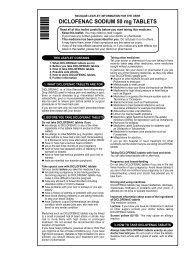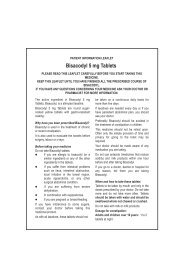Spironolactone 25mg & 100mg Tablets leaflet approved ... - Genesis
Spironolactone 25mg & 100mg Tablets leaflet approved ... - Genesis
Spironolactone 25mg & 100mg Tablets leaflet approved ... - Genesis
Create successful ePaper yourself
Turn your PDF publications into a flip-book with our unique Google optimized e-Paper software.
PACKAGE LEAFLET: INFORMATION FOR THE USER<br />
SPIRONOLACTONE<br />
25 mg & 100 mg TABLETS<br />
Read all of this <strong>leaflet</strong> carefully before you start<br />
taking this medicine.<br />
- Keep this <strong>leaflet</strong>. You may need to read it again.<br />
- If you have any further questions, ask your doctor<br />
or pharmacist.<br />
- This medicine has been prescribed for you.<br />
Do not pass it on to others. It may harm them,<br />
even if their symptoms are the same as yours.<br />
- If any of the side effects become serious, or if you<br />
notice any side effects not listed in this <strong>leaflet</strong>,<br />
please tell your doctor or pharmacist.<br />
THIS LEAFLET CONTAINS<br />
1. What <strong>Spironolactone</strong> is for<br />
2. Before you take <strong>Spironolactone</strong><br />
3. How to take <strong>Spironolactone</strong><br />
4. Possible side effects<br />
5. How to store <strong>Spironolactone</strong><br />
6. Further information<br />
1. WHAT SPIRONOLACTONE IS FOR<br />
<strong>Spironolactone</strong> belongs to a group of medicines<br />
called diuretics (water tablets).<br />
<strong>Spironolactone</strong> can be used to stop the build up of<br />
extra water in your body. It does this without loss of<br />
potassium from your body. This extra water can be<br />
due to:<br />
congestive heart failure causing swollen ankles<br />
or shortness of breath<br />
nephrotic syndrome (a kidney disorder)<br />
hepatic cirrhosis (liver disease) causing ascites<br />
(build up of fluid in your abdomen) or oedema<br />
(build up of fluid in your body causing swelling of<br />
the arms, hands, legs or feet)<br />
malignant ascites (a condition in which fluid<br />
containing cancer cells collect in your abdomen)<br />
primary aldosteronism (a condition in which your<br />
adrenal glands release too much of the hormone<br />
aldosterone)<br />
hypertension (high blood pressure) due to<br />
primary aldosteronism.<br />
<strong>Spironolactone</strong> works by helping you to pass more<br />
water (urine) than you usually do.<br />
2. BEFORE YOU TAKE SPIRONOLACTONE<br />
Do not take <strong>Spironolactone</strong> and tell your<br />
doctor if you<br />
are allergic to <strong>Spironolactone</strong> or any of the other<br />
ingredients in the tablets (listed in section 6 of<br />
this <strong>leaflet</strong>)<br />
have Addison's disease. This is when your<br />
adrenal glands are not working properly. It can<br />
cause weakness, tiredness, weight loss and low<br />
blood pressure<br />
have severe kidney problems<br />
have high blood levels of potassium<br />
have low blood levels of sodium<br />
are not passing any water (urine).<br />
Take special care with <strong>Spironolactone</strong><br />
Tell your doctor before you take this medicine if you<br />
have liver or kidneys problems<br />
suffer from porphyria (an inherited iron disorder).<br />
Regular blood and urine tests may be needed to<br />
monitor your fluid and electrolyte (e.g. potassium<br />
and sodium) levels, especially if you are elderly or<br />
have liver or kidneys problems.<br />
Taking other medicines<br />
Tell your doctor or pharmacist if you are taking or<br />
have recently taken, any other medicines, even<br />
medicines bought without a prescription.<br />
In particular, tell your doctor or pharmacist if you are<br />
taking any of the following medicines, as they may<br />
affect how <strong>Spironolactone</strong> tablets work:<br />
Other diuretics such as Amiloride or Triamterene<br />
Medicines or supplements containing potassium<br />
(including table salt substitutes)<br />
Medicines to treat heart failure or irregular<br />
heartbeats such as Digoxin, Digitoxin or<br />
Eplerenone<br />
Medicines to treat high blood pressure such as<br />
Captopril, Candesartan, Clonidine,<br />
Guanethidine, Doxazosin, Atenolol, Amlodipine<br />
or Sodium Nitroprusside. Your doctor may need<br />
to change the dose of your medicine<br />
Medicines to treat chest pain such as Glyceryl<br />
Trinitrate<br />
Medicines for depression or mental health<br />
problems such as Lithium, Amisulpride,<br />
Pimozide, Sertindole, Amitriptyline, Moclobemide<br />
or Prochlorperazine<br />
Medicines to calm you down or to help you sleep<br />
such as Diazepam<br />
Carbamazepine to treat epilepsy<br />
Trilostane for Cushings syndrome or breast cancer<br />
Ciclosporin or Tacrolimus to stop the rejection of<br />
organs after transplants<br />
Cisplatin to treat various types of cancer<br />
Non-Steroidal Anti-Inflammatory Drugs (NSAIDs)<br />
such as Aspirin, Ibuprofen or Ketorolac for pain<br />
and swelling<br />
Chlorpropramide to treat diabetes<br />
Steroids such as Hydrocortisone or<br />
Prednisolone to treat inflammation and allergies<br />
Oestrogens for contraception or hormone<br />
replacement therapy.<br />
<strong>Spironolactone</strong> does not cause loss of potassium<br />
from your body as other water tablets do. Therefore,<br />
it is not necessary for you to get extra potassium in<br />
your diet or take supplements. Too much potassium<br />
could even be harmful.<br />
AVOID ALCOHOL whilst taking this medicine.<br />
If you are going to have an operation where you will<br />
be given an anaesthetic, tell the doctor in charge<br />
that you are taking <strong>Spironolactone</strong>.<br />
Pregnancy and breast-feeding<br />
Talk to your doctor before taking this medicine if you<br />
are pregnant, planning a pregnancy or are breastfeeding.<br />
Make sure you follow your doctor's advice.<br />
Driving and using machines<br />
<strong>Spironolactone</strong> may cause drowsiness or dizziness.<br />
If affected do not drive or operate machinery.
3. HOW TO TAKE SPIRONOLACTONE<br />
Always take <strong>Spironolactone</strong> tablets exactly as<br />
your doctor has told you. Take this medicine once<br />
a day with a meal.<br />
Dosage<br />
Your doctor will decide your dose and length of<br />
treatment, as it depends on your condition.<br />
Adults:<br />
The usual adult dose varies from 25-200 mg once<br />
a day.<br />
Elderly:<br />
Your doctor may start you on a low starting dose<br />
and gradually increase the dosage as needed to<br />
obtain the desired effect.<br />
Children:<br />
Your doctor will work out the number of tablets that<br />
you should give to your child, as it depends on your<br />
child's weight. The tablets can be crushed and<br />
taken with food or drink if necessary.<br />
If you take more <strong>Spironolactone</strong> than you<br />
should<br />
Contact your doctor or go to a hospital immediately.<br />
Take the package or container with you. Symptoms<br />
of an overdose may include drowsiness, dizziness,<br />
confusion, nausea, vomiting or diarrhoea.<br />
If you forget to take <strong>Spironolactone</strong><br />
Don't worry, just take your next scheduled dose at<br />
the correct time. Do not take a double dose to make<br />
up for the one you have missed.<br />
If you stop taking <strong>Spironolactone</strong><br />
DO NOT STOP taking <strong>Spironolactone</strong> until your<br />
doctor tells you to. If you stop taking the tablets too<br />
soon, your condition may get worse.<br />
If you have any further questions on the use of this<br />
medicine, ask your doctor or pharmacist.<br />
4. POSSIBLE SIDE EFFECTS<br />
Like all medicines, <strong>Spironolactone</strong> tablets can cause<br />
side effects, although not everybody gets them.<br />
If you have an allergic reaction to<br />
<strong>Spironolactone</strong> see a doctor straight away<br />
An allergic reaction may include:<br />
skin rash, redness, itching or hives<br />
swelling of the face, lips, mouth or throat<br />
difficulty in breathing or swallowing.<br />
If you get any of the following side effects,<br />
STOP TAKING <strong>Spironolactone</strong> and see your<br />
doctor as soon as possible:<br />
high blood levels of potassium, which can cause<br />
muscle weakness, tiredness or irregular<br />
heartbeats<br />
low blood levels of sodium, which can cause<br />
tiredness, confusion, muscle cramps, fits or coma<br />
liver damage, which can cause yellowing of the<br />
skin or whites of the eyes (jaundice)<br />
kidney damage, which can cause dehydration,<br />
loss of appetite, aches and pains in the stomach<br />
area or blood in your urine<br />
blood disorders, which can cause unexplained<br />
bleeding, bruising, sore throat, general illness or<br />
fever.<br />
The side effects mentioned above may alter the<br />
results of blood and urine tests.<br />
Other side effects include:<br />
headache, dizziness, tiredness or confusion<br />
stomach upsets, nausea, vomiting or diarrhoea<br />
breast enlargement in men (this usually goes<br />
away when treatment is stopped)<br />
inability to achieve or maintain an erection<br />
(impotence)<br />
menstrual problems in women<br />
soft bones<br />
increase in the number of times and the amount<br />
of water (urine) you pass. This may be due to the<br />
medicine.<br />
If any of the side effects become serious, or if<br />
you notice any side effects not listed in this<br />
<strong>leaflet</strong>, please tell your doctor or pharmacist.<br />
5. HOW TO STORE SPIRONOLACTONE<br />
Keep out of the reach and sight of children.<br />
Do not store above 25°C. Store in the original<br />
package or container and keep the container tightly<br />
closed.<br />
Do not use these tablets after the expiry date, which<br />
is stated on the package or container. The expiry<br />
date refers to the last day of that month.<br />
Medicines should not be disposed of via wastewater<br />
or household waste. Ask your pharmacist how to<br />
dispose of medicines no longer required. These<br />
measures will help to protect the environment.<br />
6. FURTHER INFORMATION<br />
What <strong>Spironolactone</strong> tablets contain<br />
The active ingredient in <strong>Spironolactone</strong> 25 mg and<br />
100 mg tablets is spironolactone. The other<br />
ingredients are calcium sulphate dihydrate, maize<br />
starch, crospovidone, povidone, pregelatinised<br />
starch, magnesium stearate, peppermint flavour<br />
(peppermint oil and starch) and quinoline yellow<br />
(E104).<br />
What <strong>Spironolactone</strong> tablets look like and<br />
contents of the pack<br />
The 25 mg tablets are pale yellow tablets with the<br />
marking MP28 on one side. The 100 mg tablets are<br />
pale yellow tablets with the marking MP29 on one<br />
side. Both strengths have a peppermint odour.<br />
The tablets come in blister packs and containers of<br />
28, 30, 50, 56, 60, 84, 100, 250, 500 and 1000<br />
tablets. Not all pack sizes may be marketed.<br />
Marketing Authorisation Holder<br />
Metwest Pharmaceuticals Limited,<br />
15 Runnelfield, Harrow on the Hill,<br />
Middlesex HA1 3NY<br />
Manufacturer<br />
Haupt Pharma Berlin GmbH, Gradestrasse 13,<br />
Moosrosenstrasse 5 and Britzer Damm 120,<br />
12347 Berlin, Germany<br />
For more information about this product, please<br />
contact the Marketing Authorisation Holder.<br />
This <strong>leaflet</strong> was last <strong>approved</strong> in 05/2009<br />
SPL0028-29/0025&0100T/LEA005





